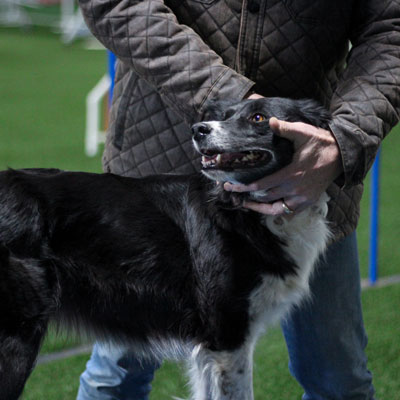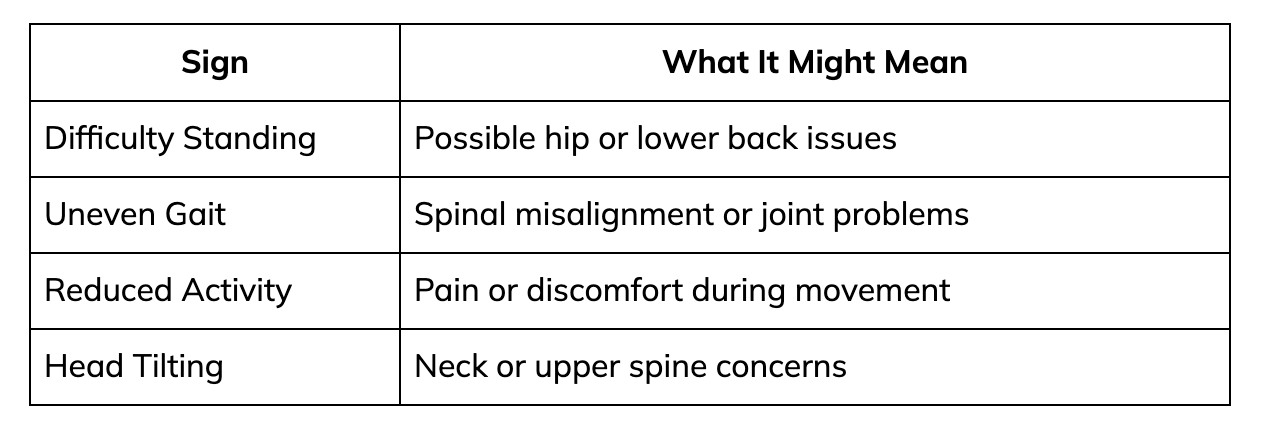Last Updated on 3 months by Dr Alisha Barnes

Recognizing when your pet needs chiropractic care involves attention to changes in their movement and behavior. Common signs include stiffness, difficulty jumping or climbing, limping, decreased activity, and pain when touched. Pets may also develop poor posture or show discomfort after regular exercise.
Chiropractic care can help improve mobility, relieve pain, and support overall health by addressing misalignments in the spine. If your pet shows any of these symptoms, consulting with a veterinarian experienced in chiropractic care can provide relief and enhance their quality of life.
Understanding Animal Chiropractic: More Than Just a Pet Massage
As veterinary professionals specializing in animal chiropractic, we often see pets brought in only after showing obvious signs of discomfort. Just like humans, pets benefit from spinal care before problems become severe. Animal chiropractic combines manual therapy with a deep understanding of animal biomechanics to support natural healing.
Think of your pet’s spine as a superhighway for their nervous system. When there’s a “traffic jam” (misalignment), it can affect everything from mobility to mood!
Warning Signs: When Your Pet is Trying to Tell You Something
Behavioral Changes: The Silent Signals
Have you noticed your typically playful pup becoming a couch potato? Or is your social cat suddenly hiding under the bed? Here’s what to watch for:
- Increased irritability or unexplained aggression
- Unusual lethargy or depression
- Changes in social interaction with family or other pets
- Resistance to being touched in specific areas
Pro Tip: Keep a “behavior diary” to track changes. Even subtle shifts can be significant!
Physical Signs That Shouldn’t Be Ignored

The Not-So-Obvious Symptoms
Some signs of spinal issues aren’t as apparent as limping or whining:
- Digestive Changes: Nerve interference can affect gut health
- Appetite Fluctuations: Pain can reduce interest in food
- Sleep Pattern Changes: Discomfort may affect rest quality
- Grooming Habits: Difficulty reaching certain areas
How Animal Chiropractic Helps: Beyond Pain Relief
Working with the American Veterinary Chiropractic Association (AVCA) guidelines, we’ve seen remarkable improvements in pets receiving regular care:
Immediate Benefits
- Pain Reduction: Natural relief without medication
- Improved Mobility: Better range of motion
- Enhanced Comfort: Reduced muscle tension
Long-term Advantages
- Better Athletic Performance: Ideal for sporting dogs
- Stronger Immune System: Through improved nerve function
- Reduced Anxiety: By addressing physical stress
- Improved Digestion: Through better nerve communication
Conditions That Respond Well to Chiropractic Care
Our experience, backed by research from the International Veterinary Academy of Pain Management (IVAPM), shows particular success with:
Musculoskeletal Issues
- Arthritis management
- Hip dysplasia support
- Disc disease relief
- Post-surgery recovery
- Sports injuries
Neurological Conditions
- Nerve compression
- Balance issues
- Coordination problems
Treatment Expectations: What Happens
First-time visitors often ask, “Will it hurt my pet?” The answer is a resounding no! Here’s what to expect:
Initial Visit:
- Comprehensive examination (30-45 minutes)
- Medical history review
- Gentle assessment of spine and joints
- Custom treatment plan development
Follow-up Visits:
- Shorter sessions (15-20 minutes)
- Progress evaluation
- Adjustments as needed
- Exercise recommendations
Fun Fact: Many pets enjoy their adjustments so much they fall asleep during treatment!
Special Considerations for Different Pets
Dogs
- Athletic dogs may need more frequent adjustments
- Senior dogs benefit from gentler techniques
- Working dogs require performance-focused care
Cats
- Often respond quickly to treatment
- May need shorter sessions
- Require specialized gentle approaches
Other Pets
- Rabbits and small mammals can benefit, too
- Horse chiropractic requires special certification
- Exotic pets need specialized protocols
Tails Animal Chiropractic Care Reminder: Remember, prevention is better than cure! Regular check-ups can catch issues before they become problems.
Expert Tip: Look for practitioners certified by the AVCA and your state’s veterinary board. The best care comes from those with comprehensive veterinary medicine and animal chiropractic training.
